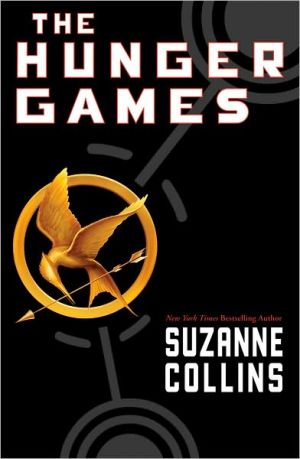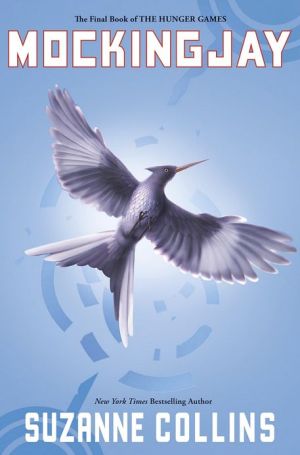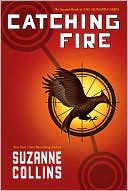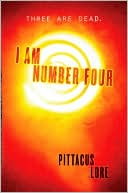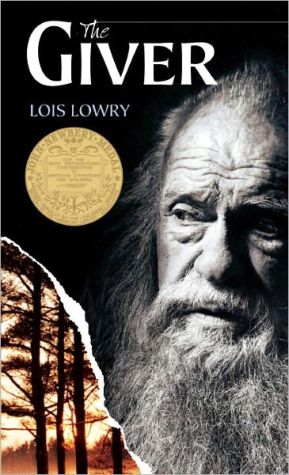The Hunger Games (Hunger Games Series #1)
In the ruins of a place once known as North America lies the nation of Panem, a shining Capitol surrounded by twelve outlying districts. The Capitol is harsh and cruel and keeps the districts in line by forcing them all to send one boy and one girl between the ages of twelve and eighteen to participate in the annual Hunger Games, a fight to the death on live TV. Sixteen-year-old Katniss Everdeen, who lives alone with her mother and younger sister, regards it as a death sentence when she is...
Search in google:
In the ruins of a place once known as North America lies the nation of Panem, a shining Capitol surrounded by twelve outlying districts. The Capitol is harsh and cruel and keeps the districts in line by forcing them all to send one boy and one girl between the ages of twelve and eighteen to participate in the annual Hunger Games, a fight to the death on live TV. Sixteen-year-old Katniss Everdeen, who lives alone with her mother and younger sister, regards it as a death sentence when she is forced to represent her district in the Games. But Katniss has been close to dead before-and survival.The Barnes & Noble ReviewSixteen-year-old Katniss is smart, athletic, and fast. She can take down a rabbit with a bow and arrow, hitting it straight through the eye. Will these skills be enough to survive the Hunger Games? Suzanne Collins, the author of the middle-grade fantasy series The Underland Chronicles begins anew, exploring a future landscape that will be familiar to devotees of science fiction's dystopic strain. In a nation called Panem, which occupies the landmass that is the present United States, a parasitical fascist Capitol dominates 12 conquered districts. There was a thirteenth district but it was obliterated during a rebellion. The totalitarian government keeps the subjected populations in line by threatened devastation, starvation, and brutality.
\ John Greenbrilliantly plotted and perfectly paced…a futuristic novel every bit as good and as allegorically rich as Scott Westerfeld's Uglies books…the considerable strength of the novel comes in Collins's convincingly detailed world-building and her memorably complex and fascinating heroine. In fact, by not calling attention to itself, the text disappears in the way a good font does: nothing stands between Katniss and the reader, between Panem and America. This makes for an exhilarating narrative and a future we can fear and believe in, but it also allows us to see the similarities between Katniss's world and ours.\ —The New York Times\ \ \ \ \ Mary QuattlebaumThis gripping tale explores ever-timely topics—violence-as-entertainment and rule-by-intimidation—and through Katniss holds out the possibility of change.\ —The Washington Post\ \ \ Publishers WeeklySignatureReviewed by Megan Whalen TurnerIf there really are only seven original plots in the world, it's odd that "boy meets girl" is always mentioned, and "society goes bad and attacks the good guy" never is. Yet we have Fahrenheit 451, The Giver, The House of the Scorpion-and now, following a long tradition of Brave New Worlds, The Hunger Games. Collins hasn't tied her future to a specific date, or weighted it down with too much finger wagging. Rather less 1984 and rather more Death Race 2000, hers is a gripping story set in a postapocalyptic world where a replacement for the United States demands a tribute from each of its territories: two children to be used as gladiators in a televised fight to the death.Katniss, from what was once Appalachia, offers to take the place of her sister in the Hunger Games, but after this ultimate sacrifice, she is entirely focused on survival at any cost. It is her teammate, Peeta, who recognizes the importance of holding on to one's humanity in such inhuman circumstances. It's a credit to Collins's skill at characterization that Katniss, like a new Theseus, is cold, calculating and still likable. She has the attributes to be a winner, where Peeta has the grace to be a good loser.It's no accident that these games are presented as pop culture. Every generation projects its fear: runaway science, communism, overpopulation, nuclear wars and, now, reality TV. The State of Panem-which needs to keep its tributaries subdued and its citizens complacent-may have created the Games, but mindless television is the real danger, the means by which societypacifies its citizens and punishes those who fail to conform. Will its connection to reality TV, ubiquitous today, date the book? It might, but for now, it makes this the right book at the right time. What happens if we choose entertainment over humanity? In Collins's world, we'll be obsessed with grooming, we'll talk funny, and all our sentences will end with the same rise as questions. When Katniss is sent to stylists to be made more telegenic before she competes, she stands naked in front of them, strangely unembarrassed. "They're so unlike people that I'm no more self-conscious than if a trio of oddly colored birds were pecking around my feet," she thinks. In order not to hate these creatures who are sending her to her death, she imagines them as pets. It isn't just the contestants who risk the loss of their humanity. It is all who watch.Katniss struggles to win not only the Games but the inherent contest for audience approval. Because this is the first book in a series, not everything is resolved, and what is left unanswered is the central question. Has she sacrificed too much? We know what she has given up to survive, but not whether the price was too high. Readers will wait eagerly to learn more.Megan Whalen Turner is the author of the Newbery Honor book The Thief and its sequels, The Queen of Attolia and The King of Attolia. The next book in the series will be published by Greenwillow in 2010.Copyright © Reed Business Information, a division of Reed Elsevier Inc. All rights reserved.\ \ \ \ \ VOYASixteen-year-old Katniss Everdeen cannot believe it when her younger sister Prim is chosen as the female tribute from their district at the Reaping. In this futuristic society, each district is required to send two tributes to the Games in the Capitol where they must fight to the death while the whole country watches on live television. To protect her sister, Katniss volunteers to take her place, knowing that she will probably never again return home. Twenty-four young people are dropped off in a remote area and must fight for survival against the harsh conditions and each other. Only one is allowed to live. Katniss and Peeta, the other tribute from District 12, form an uneasy alliance that blossoms into romance amid the brutality and deprivation of the Hunger Games. Katniss and Peeta try to rebel against the Gamemakers but discover that they must play the game to its end. Collins moves up a level from the Gregor the Overlander books in this gripping story that is the first of a new trilogy. Themes of government control, "big brother," and personal independence are explored amidst a thrilling adventure that will appeal to science fiction, survival, and adventure readers. The suspense of this powerful novel will keep the reader glued to the page long after bedtime. Reviewer: Deborah L. Dubois\ \ \ \ \ John RitchieTa ke the ancient Greek myth of Crete demanding Athens send 14 of its children as sacrificial tributes, substitute the minotaur for gladiator combat pitting the youths against one another, set it in a dystopic future, make it all entertainment for the reality television of a tyrannical government, and then give it characters that add his/her own twist to the story— these are the ingredients for The Hunger Games, the first book in a thrilling new trilogy from Suzanne Collins. Collins doesn't waste a single character in the entire novel. From our narrator-heroine Katniss Everdeen, to her Hunger Games sponsor Haymitch Abernathy, to Hunger Games show host Caesar Flickerman, each character is rich in depth and worthy of his/her own story. Collins also keeps the action moving at a smooth and quick pace. The novel is violent without ever being bloody. Collins avoids easy, Hollywood-style endings and gives us realistic, complex characters. Librarians and teachers will have a hard time keeping this book on their shelves. Reviewer: John Ritchie\ \ \ \ \ KLIATTThis is an amazingly suspenseful story, combining the familiar ("Survivor"-type TV shows) with details of a horrific future. Once again, an author chooses a future in which some calamity has created a society cowed into submission by dictators, and manipulated and controlled through technology. The Hunger Games are this future culture's way of entertaining and frightening the people, all at once. Young people are chosen by lot as participants in the games. Once chosen, the "contestants" scheme for the others' deaths—real deaths—because that is the only way to survive: to be the last person standing. The people follow the "action" via camera, with strategy and suffering presented as entertainment (sort of like the action in the Roman Empire's Coliseum, I suppose). The heroine is 16-year-old Katniss, a skilled hunter and survivor managing to keep her mother and younger sister alive in their repressive society. When Katniss's younger sister, who is not very strong, draws the lot, Katniss takes her place, willing to die for her family. In a masterstroke of strategic planning, Katniss teams up with another contestant, a boy she has known in her village, to ensure their survival. The "games" themselves are nonstop action: physical, mental, emotional. Readers will be absorbed in the action, identifying with Katniss and frightened by this view of a possible future. Reviewer: Claire Rosser\ \ \ \ \ School Library JournalGr 7 Up\ Suzanne Collins's first book (Scholastic, 2008) of a planned trilogy introduces an easy-to-imagine, cruel future society divided by wealth and obsessed with media and celebrity. The controlling Capitol broadcasts the Hunger Games, mandatory watching for all citizens of Panem. The annual event pits 24 Tributes-a girl and boy teen from each of the 12 Districts surrounding the Capitol-against one another in a desperate battle to the death. When 16-year-old Katniss Everdeen steps forward to take her younger sister's place as District Twelve's girl Tribute, she is thrown into a media frenzy, complete with stylists and costumes, literally fighting for her life in the arena. Intense, graphic action, along with a touch of romance, makes this dystopic adventure a great choice for older reluctant readers. Although the plot mimics both Stephen King's The Long Walk (Penguin, 1999) and Running Man (Signet, 1999) as well as Koushon Takami's Battle Royale (Tokyopop, 2007), Collins creates a fascinating world and Katniss is a believably flawed and interesting character. Carolyn McCormick ably voices the action-packed sequences and Katniss's every fear and strength shines through, along with her doomed growing attraction to one of her fellow Tributes. This engrossing audiobook belongs in all public and school libraries.-Charli Osborne, Oxford Public Library, MI\ \ \ \ \ \ Kirkus ReviewsKatniss Everdeen is a survivor. She has to be; she's representing her District, number 12, in the 74th Hunger Games in the Capitol, the heart of Panem, a new land that rose from the ruins of a post-apocalyptic North America. To punish citizens for an early rebellion, the rulers require each district to provide one girl and one boy, 24 in all, to fight like gladiators in a futuristic arena. The event is broadcast like reality TV, and the winner returns with wealth for his or her district. With clear inspiration from Shirley Jackson's "The Lottery" and the Greek tale of Theseus, Collins has created a brilliantly imagined dystopia, where the Capitol is rich and the rest of the country is kept in abject poverty, where the poor battle to the death for the amusement of the rich. Impressive world-building, breathtaking action and clear philosophical concerns make this volume, the beginning of a planned trilogy, as good as The Giver and more exciting. However, poor copyediting in the first printing will distract careful readers-a crying shame. (Science fiction. 11 & up)\ \ \ \ \ The Barnes & Noble ReviewSixteen-year-old Katniss is smart, athletic, and fast. She can take down a rabbit with a bow and arrow, hitting it straight through the eye. Will these skills be enough to survive the Hunger Games? \ Suzanne Collins, the author of the middle-grade fantasy series The Underland Chronicles begins anew, exploring a future landscape that will be familiar to devotees of science fiction's dystopic strain. In a nation called Panem, which occupies the landmass that is the present United States, a parasitical fascist Capitol dominates 12 conquered districts. There was a thirteenth district but it was obliterated during a rebellion. The totalitarian government keeps the subjected populations in line by threatened devastation, starvation, and brutality.\ The horrific rite at the heart of this culture is an annual event -- somewhere between a sport and a sacrifice -- is The Reaping. Two adolescent tributes from each district, one boy and one girl, ages ranging from 12 to 18, are selected. Although it will come as no surprise that the opening brings to mind Shirley Jackson's "The Lottery," the plot veers quickly in another direction. The tributes are taken from their home district, and in a contrived Survivor-like reality show, are forced to fight each other to the death. A selective real-time video is played on television. And in an interesting twist, watching The Hunger Games is mandatory.\ Our heroine and narrator is Katniss Evergreen, a practical, level-headed teen and the sole support of her mother and younger sister. Her father having died in a mine explosion (the family lives in a coal-mining district with an Appalachian feel, called the Seam), without Katniss's ability to sneak into the forbidden forest to poach, her family would starve. We join her the day of the drawing. The odds are definitely not in her favor -- because of age and poverty, her name is entered many more times than average, and the same is true of her hunting companion, Gale. Katniss barely registers that her 12-year-old sister's name had been called when she dashes to the stage and volunteers to replace her. The second tribute from her district is Peeta, the baker's son.\ The 24 teens are then sequestered in the Capitol, where a team of stylists -- and here is one aspect of how the author uses our familiarity with television shows like Survivor to recast a venerable science-fiction scenario -- is assigned to primp and prepare them for the Hunger Games. The more attractive and personable participants have better the odds of obtaining a sponsor. A wealthy sponsor can provide expensive gifts of food and medicine during the games that could mean the difference between life and death. District Twelve's prep team creates an illusion of romance between Katnis and Peeta to garner sympathy and perhaps support for these players.\ Not that Katniss and Peeta think they have a chance. It has been more than 30 years since a winner came from District Twelve. Many of the other combatants are from the richer districts. These Career Tributes have been training their whole lives for this moment. They are healthy, well fed, and aggressive: one of them always wins.\ Part of the drama involves watching Katniss and Peeta's responses as they are torn from a simple life of surviving in a harsh, oppressive existence and dropped into a technologically sophisticated environment. We luxuriate along with them as they experience an abundance of food and sumptuous clothing, as well as having all of their physical needs met. But there are constant reminders of the dark underside of these moments of pleasure. Not the least is a servant whose tongue was removed as a punishment for running away. Katniss recalls for us of the power of the Government to genetically engineer predators for their own amusement. Readers aren't allowed to forget that the end of this journey is a violent and spectacular death, broadcast to the nation.\ Collins is a skillful storyteller who makes this nightmare vision a convincing one. Well-drawn characters range from the insensitive, relentlessly cheerful government representative, Effie Trinket (who resents being assigned to such a hopelessly low-profile district) to Haymitch, the last winner from their district, who -- despite his continuous inebriation -- may become a resourceful and effective mentor. Given the high stakes, Katniss's single-minded focus on survival and predicting the others' strategy, to the disregard of nearly all else, is believable. The plotting is tight, and Collins throws readers with plenty of small details that complicate the scenario and build suspense. Is there a secret rebellion amongst the citizens of the Capitol? What is the secret talent that gave tiny Rue such a high score? Will Peeta, who has no skill for either hunting or fighting, be even able to survive the first day? Is this an act or does he really love Katniss?\ One of the most pleasurable aspects of the book is the treatment of the contrasting Districts and their struggles. When Katniss finds an unlikely ally in slight birdlike Rue, we find out that even in the agricultural districts the farmers are starving, a faint echo of the Irish Famine. The behavior of the oppressed may remind readers of the occupants of the Warsaw or Lodz Ghettos, with the internal hierarchy of governing class that collaborated with the oppressors to maintain order. Other elements of the society bring to mind the former Soviet Union's domination of satellite states. No one will miss the similarity of the inhabitants of the Capitol to some present-day citizens of the United States, who combine an obsession for entertainment and celebrities with a blindness toward those who are suffering.\ Are these topics for seventh graders? Twelve-year-olds are certainly familiar with these themes. In the microcosm on the classroom, children experience cruelty and deprivation, some just trying to survive to adulthood. Behind closed doors some are abused, and small kindnesses take on disproportionate meaning. Survival sometimes depends on letting others help. A good classroom culture emphasizes the need in a strong community for compassionate members who care for the weakest. Young readers will be able divine a deeper meaning from what on the surface might seem to be the depiction of a violent reality-television show.\ Does Suzanne Collins try to pack too much into this dystopic society? Probably, but this ambitious novel, threaded with romantic tension, cliffhanging uncertainty, and an engrossing vision of a possible tomorrow is likely to keep readers riveted. --Lisa Von Drasek\ Lisa Von Drasek is the children's Librarian at the Bank Street College of Education. Her reviews and commentary have appeared in School Library Journal, The New York Times, Kirkus Reviews, The Bark, Knowledge Quest, Teaching K-8, Nick Jr., and more.\ \ \
